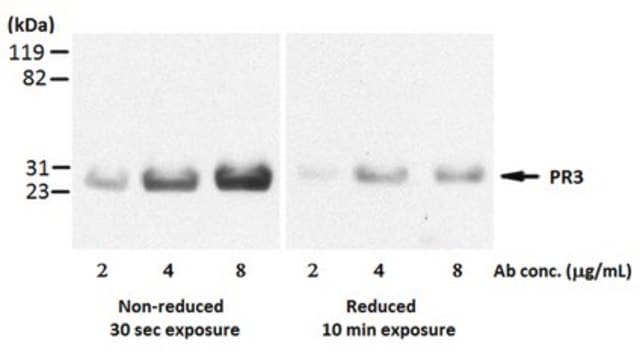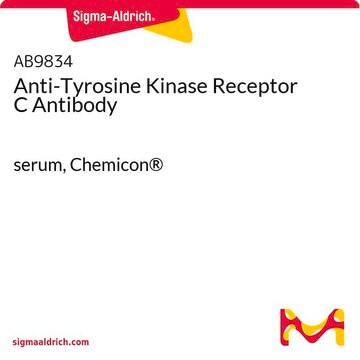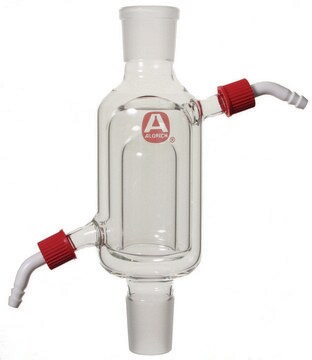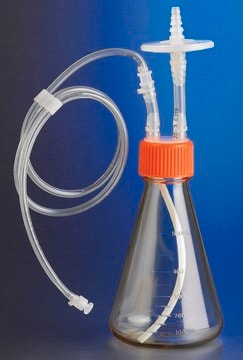HTS054M
ChemiScreen CXCR6 Membrane Preparation
Human CXCR6 GPCR membrane preparation for Radioligand binding Assays & GTPγS binding.
Iniciar sesiónpara Ver la Fijación de precios por contrato y de la organización
About This Item
UNSPSC Code:
41106514
eCl@ss:
32161000
NACRES:
NA.84
Productos recomendados
biological source
human
Quality Level
recombinant
expressed in Chem-1 cells
manufacturer/tradename
ChemiScreen
Chemicon®
technique(s)
ligand binding assay: suitable (GTPγS)
radioligand binding assay (RLBA): suitable
NCBI accession no.
UniProt accession no.
shipped in
dry ice
General description
Human CXCR6 cDNA
The GPCR CXCR6 (previously known as BONZO, STRL33 and TYMSTR) binds selectively to the free chemokine domain of CXCL16, which is derived from a membrane-bound precursor containing a CXC-containing chemokine domain, a glycosylated mucin-like domain, and a transmembrane domain (Wilbanks et al., 2001) CXCR6 is selectively expressed on Th1, Th2 and Tr1 T cell subsets, whereas CXCL16 is expressed on monocytes/macrophages and dendritic cells (Tabata et al., 2005). CXCR6 promotes migration of activated lymphocytes to sites of inflammation in tissues such as liver and synovium (Nanki et al., 2005, Sato et al., 2005). Chemicon′s CXCR6 membrane preparations are crude membrane preparations made from our proprietary stable recombinant cell lines to ensure high-level of GPCR surface expression; thus, they are ideal HTS tools for screening of antagonists of CXCR6 interactions with its ligands. The membrane preparations exhibit a Kd of 0.6 nM for [125I]-CXCL16. With 2.5 or 10 μg/well CXCR6 Membrane Prep and 0.5 nM [125I]-CXCL16, greater than 4-fold and 9-fold signal-to-background ratios are obtained, respectively.
Application
Human CXCR6 GPCR membrane preparation for Radioligand binding Assays & GTPγS binding.
Radioligand binding assay, and GTPγS binding.
Biochem/physiol Actions
GPCR Class: A
Protein Target: CXCR6
Target Sub-Family: Chemokine
Quality
SPECIFICATIONS:
1 unit = 5 μg for GTPγS binding assay
EC50 in GTPγS binding assay by CXCL16: 0.52 – 1.2 nM
1 unit = 5 μg for GTPγS binding assay
EC50 in GTPγS binding assay by CXCL16: 0.52 – 1.2 nM
Specifications
Inucbation Conditions
RECOMMENDED ASSAY CONDITIONS: Membranes are mixed with radioactive ligand and unlabeled competitor (see Figures 1 and 2 for concentrations tested) in binding buffer in a nonbinding 96-well plate, and incubated for 1-2 h. Prior to filtration, a GF/C 96-well filter plate is coated with 0.33% polyethyleneimine for 30 min, then washed with 50mM HEPES, pH 7.4, 0.5% BSA. Binding reaction is transferred to the filter plate, and washed 3 times (1 mL per well per wash) with Wash Buffer. The plate is dried and counted.
Binding buffer: 50 mM Hepes, pH 7.4, 5 mM MgCl2, 1 mM CaCl2, 0.2% BSA, filtered and stored at 4°C
Radioligand: [125I] CXCL16 (Perkin Elmer catalog # NEX398)
Wash Buffer: 50 mM Hepes, pH 7.4, 500mM NaCl , 0.1% BSA, filtered and stored at 4°C.
One package contains enough membranes for at least 200 assays (units), where an unit is the amount of membrane that will yield greater than 4-fold signal:background with 125I-labeled CXCL16 at 0.5 nM
RECOMMENDED ASSAY CONDITIONS: Membranes are mixed with radioactive ligand and unlabeled competitor (see Figures 1 and 2 for concentrations tested) in binding buffer in a nonbinding 96-well plate, and incubated for 1-2 h. Prior to filtration, a GF/C 96-well filter plate is coated with 0.33% polyethyleneimine for 30 min, then washed with 50mM HEPES, pH 7.4, 0.5% BSA. Binding reaction is transferred to the filter plate, and washed 3 times (1 mL per well per wash) with Wash Buffer. The plate is dried and counted.
Binding buffer: 50 mM Hepes, pH 7.4, 5 mM MgCl2, 1 mM CaCl2, 0.2% BSA, filtered and stored at 4°C
Radioligand: [125I] CXCL16 (Perkin Elmer catalog # NEX398)
Wash Buffer: 50 mM Hepes, pH 7.4, 500mM NaCl , 0.1% BSA, filtered and stored at 4°C.
One package contains enough membranes for at least 200 assays (units), where an unit is the amount of membrane that will yield greater than 4-fold signal:background with 125I-labeled CXCL16 at 0.5 nM
Physical form
One vial contains enough membranes for at least 200 assays (units), where one unit is the amount of membrane that will yield greater than 1000 cpm specific CXCL16-stimulated [35S]-GTPγS binding. If radioligand binding assays are desired, it is recommended to double the mass of membrane prep per well to increase signal window..
Liquid in packaging buffer: 50 mM Tris pH 7.4, 10% glycerol and 1% BSA with no preservatives.
Packaging method: Membrane protein was adjusted to the indicated concentration in packaging buffer, rapidly frozen, and stored at -80oC.
Liquid in packaging buffer: 50 mM Tris pH 7.4, 10% glycerol and 1% BSA with no preservatives.
Packaging method: Membrane protein was adjusted to the indicated concentration in packaging buffer, rapidly frozen, and stored at -80oC.
Storage and Stability
Store at –70°C. Product is stable for at least 6 months from the date of receipt when stored as directed. Do not freeze and thaw.
Legal Information
CHEMICON is a registered trademark of Merck KGaA, Darmstadt, Germany
Disclaimer
Unless otherwise stated in our catalog or other company documentation accompanying the product(s), our products are intended for research use only and are not to be used for any other purpose, which includes but is not limited to, unauthorized commercial uses, in vitro diagnostic uses, ex vivo or in vivo therapeutic uses or any type of consumption or application to humans or animals.
Storage Class
10 - Combustible liquids
wgk_germany
WGK 2
Certificados de análisis (COA)
Busque Certificados de análisis (COA) introduciendo el número de lote del producto. Los números de lote se encuentran en la etiqueta del producto después de las palabras «Lot» o «Batch»
¿Ya tiene este producto?
Encuentre la documentación para los productos que ha comprado recientemente en la Biblioteca de documentos.
Tohru Sato et al.
Journal of immunology (Baltimore, Md. : 1950), 174(1), 277-283 (2004-12-22)
Hepatic infiltration of activated CD8 lymphocytes is a major feature of graft-vs-host disease (GvHD). Chemoattractant cytokines and their receptors are key regulators of lymphocyte trafficking, but the involvement of chemoattractant receptors in the physiologic recruitment of cells into the inflamed
Toshihiro Nanki et al.
Arthritis and rheumatism, 52(10), 3004-3014 (2005-10-04)
Rheumatoid arthritis (RA) is a chronic inflammatory disease associated with massive T cell infiltration into the synovium. The accumulated T cells express type 1 cytokines, such as interferon-gamma (IFNgamma) and tumor necrosis factor alpha, and activated markers of inflammation, such
A Wilbanks et al.
Journal of immunology (Baltimore, Md. : 1950), 166(8), 5145-5154 (2001-04-06)
STRL33/BONZO/TYMSTR is an orphan chemokine and HIV/SIV coreceptor receptor that is expressed on activated T lymphocytes. We describe an expression cloning strategy whereby we isolated a novel chemokine, which we name CXCL16. CXCL16 is an alpha (CXC) chemokine but also
Nuestro equipo de científicos tiene experiencia en todas las áreas de investigación: Ciencias de la vida, Ciencia de los materiales, Síntesis química, Cromatografía, Analítica y muchas otras.
Póngase en contacto con el Servicio técnico







